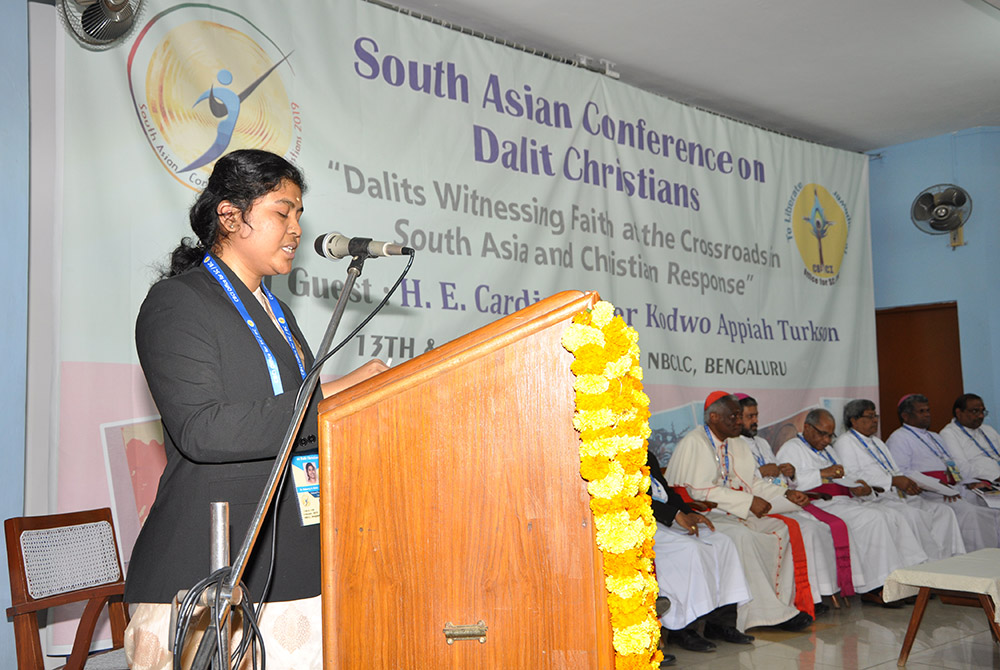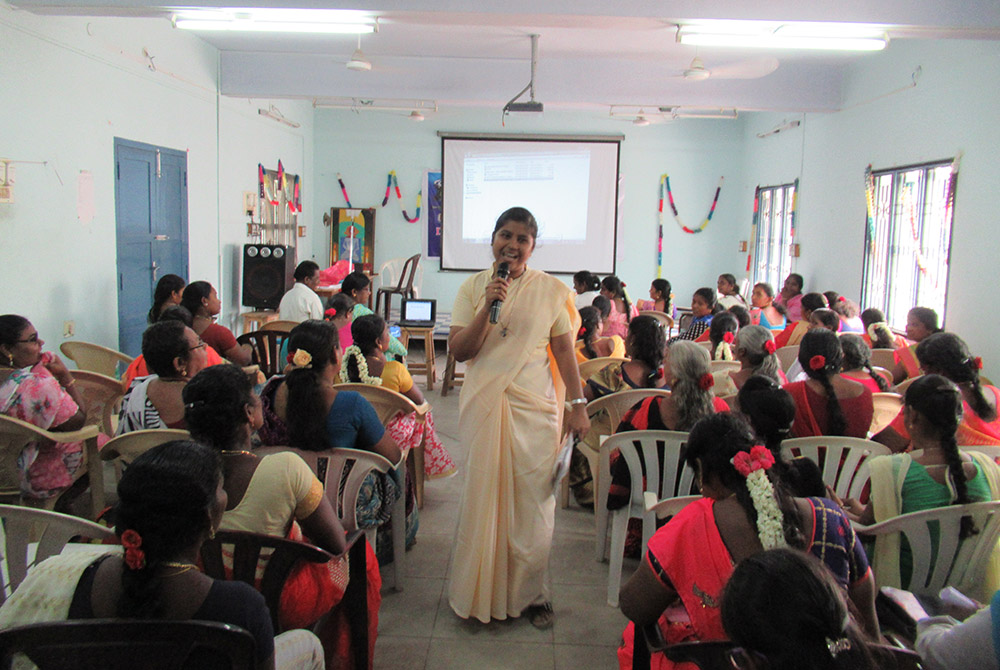
Sr. Robancy Amal Helen, speaking at the South Asian Conference on Dalit Christians organized by the Catholic Bishops' Conference of India Office for Scheduled Castes/Backward Classes (Provided photo)
My life is safe in the hands of God. This was what I told myself when I decided to leave my parents' home for the religious life.
It was a sunny day and I was ready with my luggage. I said goodbye to my parents and siblings with tears in my eyes. Though it was a painful moment, I was firm in my decision to serve God in the religious life.
It was a challenge to choose the religious life. It meant leaving behind all earthly things — my hometown and people — especially my comfort zone! I knew it would be a challenge for me, yet God wanted me to take a brave step in my life.
No one ever believed that I would choose to be a religious sister. My fear, anxiety and insecurity of being separated from my parents stopped me. But divine intervention impelled me to choose religious life.
I never wanted to live in a "bubble" where I would just look after my own life; I always wanted to do something great with my life. As a child, I was enriched by spiritual experiences, and recognized the presence of God even when I was young. Jesus led me to choose a life for him, even though I was a timid child growing up in the village of Tamil Nadu, South India.
As I journeyed in the religious life, I was always aware that I needed to serve God by ministering to people. There were moments of joy and sorrow, pain and struggle, but I never wanted to leave Christ and the plan he had for me. Each of us is responsible for fulfilling God's unique plan for us; if we can't do it, nobody can replace us.
As years went by and I tried to discern God's plan, I had the opportunity to work for the so-called "untouchables" of Indian society, the Dalits.
The origin of the word "Dalit" is from Sanskrit, and means "trampled upon." Dalits are traditionally excluded from the four-layered Hindu caste strata. They perennially face social, economic exclusion, and religious bias, exploitation and humiliation.
To get rid of pervasive subjugation, inhuman treatment, and perpetual injustice in the Hindu-dominated society, a large number of Dalits embraced Christianity and Islam. For centuries, the Dalit community has continued to lack social protection, education opportunities, economic benefits, and cultural, civil and political rights, while enduring persistent prejudices from various sections of society and government.
Out of 1.3 billion India's population, Dalits number over 300 million; Dalit women constitute about 17% of the country's female population. According to Matters India, Christians form about 28 million in the country, "but more than 60 percent of them come from Dalit and tribal communities."

Sr. Robancy A. Helen speaks during training for Dalit Christian women, organized by the Tamil Nadu Bishops' Council, Commission for Dalits and Tribes (Provided photo)
Knowing the state of Dalits, the Catholic Bishops' Conference of India is committed to work for the holistic development of the Dalits in India, especially the Christian Dalits. I was blessed to work with the Office for Scheduled Castes and Backward Classes, the official body of the CBCI formed for that purpose.
In the beginning, I did not know the reality of the Dalits, but I learned as I went through the reports. I could not tolerate the reality of how a Christian can treat another person unequally. This is not true Christianity and it is not the teaching of Christ.
I still constantly struggle to face the reality of inequality and injustice in the name of caste in India. Following the Manu dharma, the Hindu ideology, the Christians divide themselves into different groups and think that they are superior!
Though I was saddened by this experience of knowing the Indian church and society, I was encouraged to do something for my people. Jesus was with the poor, downtrodden, and the oppressed. He always had an option for the poor. The Holy Spirit kept pushing me to see the reality of the sufferings of my people.
I have surely seen the mistreatment of my people who are in Egypt and have heard their groaning, and I have come down to rescue them (Acts 7:34). Yes. These experiences of being with the underprivileged helped me to reaffirm my religious vocation. Evil can divert our path and show us worldly pleasures but God shows us His path, which is narrow and difficult. This narrow path made me realize I am called to serve the unserved and underserved.
I realized that God calls me to be the voice for the voiceless especially to be with the Dalit women. Dalits, and especially Dalit women, are placed at the lowest strata of Indian society in terms of caste and class.
Civil society groups and church personnel work for Dalit rights and dignity as part of social empowerment programs and affirmative action, but the upper caste people vehemently oppose such efforts. Anchored in patriarchy, the dominant upper caste stiffly resists any improvement of Dalits. And they inflict violence on Dalit women, who face the brunt of discrimination.
More than four Dalit women are raped every day. They are helpless. The law of the Indian government fails to protect the dignity of the Dalit women. But the Dalit Christian women, because they are Christian, are not even protected by the Prevention of Atrocities Act 1989 which is supposed to protect Dalit women against violence.
Their sufferings triggered my conscience to be with the Dalit Christian women and to work for them. Our vocation to the religious life includes reaching out and touching the lives of the people — especially the poor and the downtrodden.
Dalit Christian women's cries are often unheard. To respond to my call and mission, I started to read and listen to the stories of Dalit women, and even to interview them. I have written many stories and articles about the Dalit Christian women. Their struggles have not made them any less than they are. Their courage, conviction and faith surprised me and gave me hope.
When our Blessed Mother realized that her cousin Elizabeth needed help, she hastened to help her. God calls each one of us to serve the least people of this society, and this has to be everyone's work.
I am happy to be an instrument of God's mission. This gives me the strength to go ahead to offer my life totally to the will of God.
[Sr. Robancy A. Helen is from Tamil Nadu, South India. She belongs to the Religious Institute of Christ the Redeemer, Idente Missionaries. With an academic background in English, social work and theology, she has written and worked in womens' issues. She is currently working on doctoral studies and training Catholic youth on leadership and social issues.]
Advertisement




